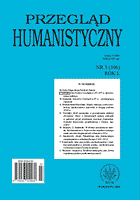HISTORIOGRAFIA POLSKA 1989–2009. BARDZO SUBIEKTYWNE PODSUMOWANIE
POLISH HISTORIOGRAPHY 1989–2009. A VERY SUBJECTIVE SUMMARY
Author(s): Tomasz WiśliczSubject(s): Cultural Essay, Political Essay, Societal Essay
Published by: Wydawnictwa Uniwersytetu Warszawskiego
Keywords: historiografia polska po 1989
Summary/Abstract: Summing up the phenomena which characterized the community of Polish historians in the last twenty years, I am focussing on the relations of the Polish scientific history to current trends in the worldwide science. It is then interesting that Polish historiography ignores postmodernist criticism of history and this attitude, not infrequently, leads to unaware realization of postmodernist principles in the awry form of cognitive relativism and creation of a picture of the past on the basis of fictional threads. The heritage of the “Annales” school was lost in Poland after 1989 despite close scientific relations in 1970s and 1980s. It means breakaway from processual, problem-oriented and synthesized history towards a limitless affirmation of a historical document as a source of knowledge. Such a method of research focalizes on tracking facts instead of understanding their sense. The responsibility lies in having gained access to, closed for decades, Polish and foreign archives, as well as with the Institute of National Remembrance which creates a public standard of a historian who searches out “how it really was” in archival documents. An important problem is also the use of historical knowledge by the Polish society. Historical politics is successful in the field of museology and its biggest failure was the case of Jedwabne: a concrete discussion of historians drowned in a political fight and the argument showed such weakness of Polish historiography as a tendency to take part in ideological discourse and lack of reflection on a category of nation. It also turned out that professional historiography in the social consciousness loses easily with dilettantish narratives about the past. A positive change in the Polish historiography is its gradual internationalization. One of its greatest international successes was the introduction of the Polish Noble Republic into national historiographies of our Eastern neighbours. Along with decentralization of the world’s historiography, there is still a chance to position Poland’s history in the world heritage of history.
Journal: Przegląd Humanistyczny
- Issue Year: 431/2010
- Issue No: 05-06
- Page Range: 37-48
- Page Count: 12
- Language: Polish
- Content File-PDF

